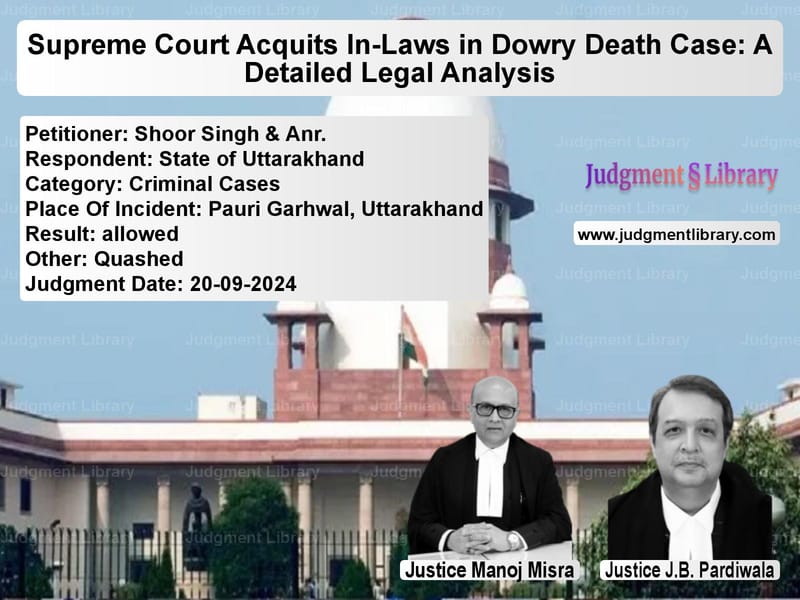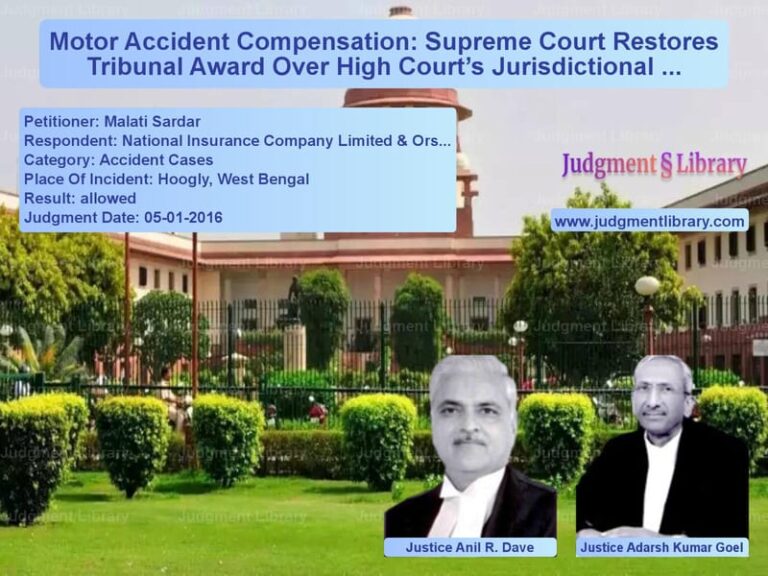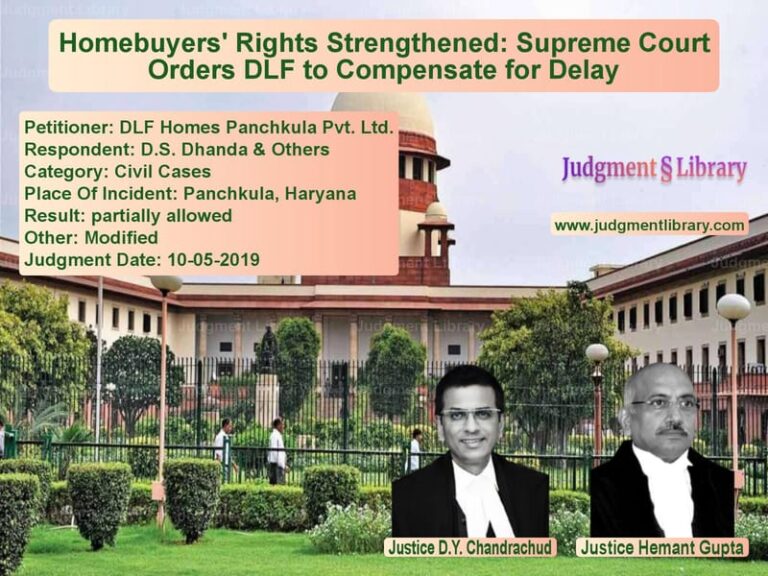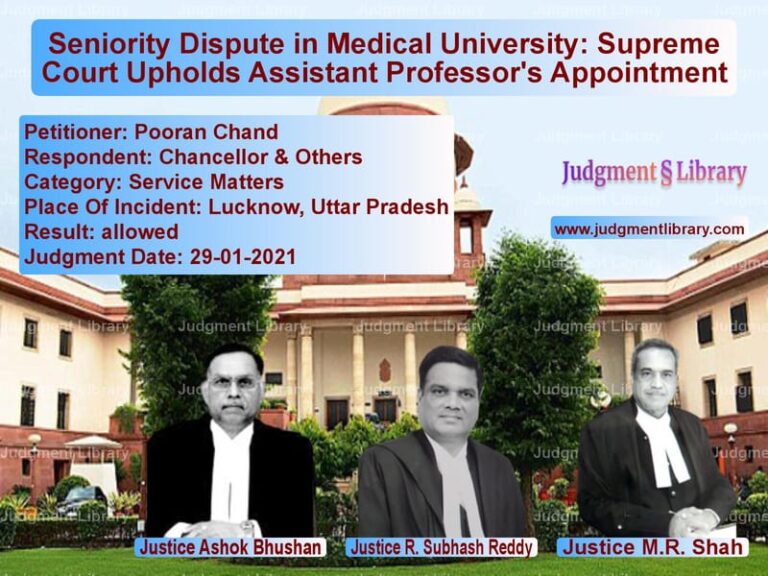Supreme Court Acquits In-Laws in Dowry Death Case: A Detailed Legal Analysis
The case of Shoor Singh & Anr. vs. State of Uttarakhand is a crucial ruling concerning the application of Section 304-B IPC (Dowry Death) and Section 498-A IPC (Cruelty). The Supreme Court overturned the conviction of the appellants, ruling that the prosecution failed to establish all essential elements required to sustain a conviction under these sections.
The judgment provides important legal clarity on the burden of proof in dowry death cases and reaffirms the necessity of proving cruelty in connection with dowry demands beyond a reasonable doubt.
Background of the Case
The appellants, Shoor Singh and Gangotri Devi, were the father-in-law and mother-in-law of the deceased, Neelam. She was married to their son, Jitendra Singh, on March 1, 2006. The couple had a child on December 30, 2006, and a naming ceremony was held on January 11, 2007.
On January 17, 2007, Neelam died due to extensive burn injuries at her matrimonial home. Her father, Shanker Singh (PW-1), filed an FIR on the same day, alleging:
- During their visit on January 4, 2007, the accused demanded a motorcycle and Rs. 50,000 in cash as dowry.
- Neelam had expressed concerns about pressure being put on her to fulfill these demands.
- The accused had murdered Neelam due to the non-fulfillment of dowry demands.
All three accused, Jitendra Singh, Shoor Singh, and Gangotri Devi, were charged under Sections 304-B and 498-A IPC and Sections 3/4 of the Dowry Prohibition Act. The trial court convicted them, sentencing them to 10 years of rigorous imprisonment, later reduced to 7 years by the High Court.
Legal Arguments
Arguments by the Appellants (Shoor Singh & Gangotri Devi)
- There was no direct evidence of them demanding dowry or harassing Neelam.
- The alleged demand was made on January 4, 2007, but her death occurred on January 17, 2007. This gap does not constitute ‘soon before death’ under Section 304-B IPC.
- The prosecution’s witnesses (PW-1 & PW-2) admitted that they never confronted the accused about the dowry demand.
- Neelam’s husband, Jitendra Singh, lived separately for work, and no allegations were made against him.
- The defense argued that Neelam committed suicide due to depression from not living with her husband.
- A photograph (Ex. Kha-1) of Neelam with a male stranger was discovered, allegedly causing emotional distress.
Arguments by the Respondent (State of Uttarakhand)
- Neelam’s statements to her parents about the dowry demand should be treated as dying declarations under Section 32 of the Evidence Act.
- The presumption under Section 113-B of the Evidence Act applies since Neelam died within seven years of marriage due to unnatural causes.
- The accused failed to provide a satisfactory explanation for Neelam’s death.
Supreme Court’s Observations
The Supreme Court analyzed the case based on the essential ingredients of Section 304-B IPC and the applicability of Section 113-B of the Evidence Act.
1. Was There a ‘Dowry Death’ Under Section 304-B IPC?
For a conviction under Section 304-B IPC, the prosecution must prove:
- The woman’s death was due to burns or unnatural causes.
- The death occurred within seven years of marriage.
- The woman was subjected to cruelty or harassment in connection with dowry demands soon before death.
The Court ruled:
“There is no reliable evidence to show that the accused subjected Neelam to cruelty in connection with dowry demands ‘soon before her death’.”
2. Did the Prosecution Prove Cruelty Under Section 498-A IPC?
The Court noted:
- No independent witnesses from the neighborhood testified about any cruelty.
- PW-1 and PW-2 admitted that they did not take the alleged dowry demand seriously.
- There was no evidence of physical violence against Neelam.
“Merely alleging cruelty without substantive proof cannot sustain a conviction under Section 498-A IPC.”
3. Did the Defense Provide a Plausible Explanation for Neelam’s Death?
The defense argued:
- Neelam was unhappy due to living separately from her husband.
- She was emotionally disturbed due to a photograph showing her with a stranger.
- None of the accused were present at home when the incident occurred.
Final Verdict
The Supreme Court set aside the conviction and ruled:
- The prosecution failed to establish the essential elements of Section 304-B IPC.
- There was no clear evidence of cruelty or harassment in connection with dowry demands.
- The accused were acquitted of all charges.
The Court emphasized the need for strict scrutiny of evidence in dowry death cases to prevent misuse of legal provisions.
Petitioner Name: Shoor Singh & Anr..Respondent Name: State of Uttarakhand.Judgment By: Justice Manoj Misra, Justice J.B. Pardiwala.Place Of Incident: Pauri Garhwal, Uttarakhand.Judgment Date: 20-09-2024.
Don’t miss out on the full details! Download the complete judgment in PDF format below and gain valuable insights instantly!
Download Judgment: shoor-singh-&-anr.-vs-state-of-uttarakhand-supreme-court-of-india-judgment-dated-20-09-2024.pdf
Directly Download Judgment: Directly download this Judgment
See all petitions in Suicide Cases
See all petitions in SC/ST Act Case
See all petitions in Fraud and Forgery
See all petitions in Judgment by Manoj Misra
See all petitions in Judgment by J.B. Pardiwala
See all petitions in allowed
See all petitions in Quashed
See all petitions in supreme court of India judgments September 2024
See all petitions in 2024 judgments
See all posts in Criminal Cases Category
See all allowed petitions in Criminal Cases Category
See all Dismissed petitions in Criminal Cases Category
See all partially allowed petitions in Criminal Cases Category







